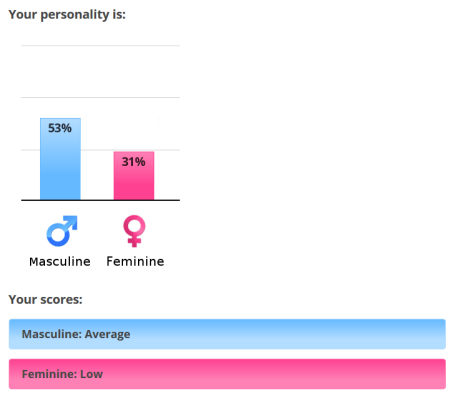“The problem with gender is that it prescribes how we should be, rather than recognising how we are.”
Chimamanda Ngozi Adichie, ‘We Should All Be Feminists’
So, I took this gender test to understand how I measure up on the gender scale. This is how the test is explained:
‘Drawing on the work of Dr. Sandra Lipsitz Bem, this test classifies your personality as masculine or feminine. Though gender stereotyping is controversial, it is important to note that Bem’s work has been tested in several countries and has repeatedly been shown to have high levels of validity and test-retest reliability. The test exclusively tests for immanent conceptions of gender (meaning that it doesn’t theorize about whether gender roles are biological, cultural, or both). Consequently, the test has been used both by feminists as an instrument of cultural criticism and by gender traditionalists who seek to confirm that gender roles are natural and heritable.’
According to the test, I am:

53% masculine (average) and 31% feminine (low). It measures traits on a scale (strongly disagree/disagree/neutral/agree/strongly agree). Traits include: individualistic, yielding, ambitious, polite, mild, ambitious, analytical, willing to take a stand, compassionate, etc. It’s so strange considering most of these traits are attributable to both men and women or more accurately: to human beings. We all contain these traits, the degree to which we possess these traits differs from one individual to another individual and I don’t believe that the determining factor is our gender.
I don’t know about you but many of us have felt the societal and cultural pressures to act in a certain way that is described to be as feminine from our elders. Being a tomboy growing up and completely lacking any social skills whatsoever, I really struggled with this. I was neither polite, friendly, warm but more so wacky, nerdy and, to put it plainly, perhaps a dash of weird too. I longed for heroine’s in books that I could relate to and thanks to YA Fantasy and general fantasy fiction, I now do. I do still feel out of place when I’m in a group that consists of women because you’re expected to bend to the will of societal norms which do not come naturally to me. Ironically, these same traits that we love in real life are the ones we despise in literature e.g. Sansa Stark (whom, by the way, I absolutely love). Having said that, I do feel society, and I too, has progressed in a way that allows me to be myself a little more confidently. We are seeing women in traditionally ‘masculine’ roles and vice versa. It’s a gradual process that will take a long time, but we are getting there in some ways.
I wanted to find out what ideologies we’re passing on to the next generation so I asked my 8-year-old cousin sister what she believes is the role of the woman and man and this is what she had to say:
(For women)
What they should do: ‘They must be kind, wear makeup, be happy, be beautiful, look pretty because a girl always has to look pretty. Be friends with other people who are lonely.’
What they do: ‘They are quiet, do the housework, take care of little brothers and sisters, do the vacuuming. They cook a lot to make sure their family are eating.’
On career: ‘They should have jobs. Maybe they could work at a hair salon. They should get paid the same as men because it should be fair and equal, they cook a lot to make sure family is eating.’
(For men):
What they should do: ‘They should be a bit quiet because they shout a lot. Girls should relax, and boys should work because its normally the opposite. Girls should ‘change the tables around.’
What they do: ‘They’re noisy and girls aren’t. They play football a lot, PS4 and games on their phone a lot.’
On career: ‘He should work at a bike store or a tools shop. Girls could too but girls don’t know much about gadgets. Men should provide because men get a lot of money.’
Notice the differences? We have a long way to go.
Advertisements Share this:
- More





